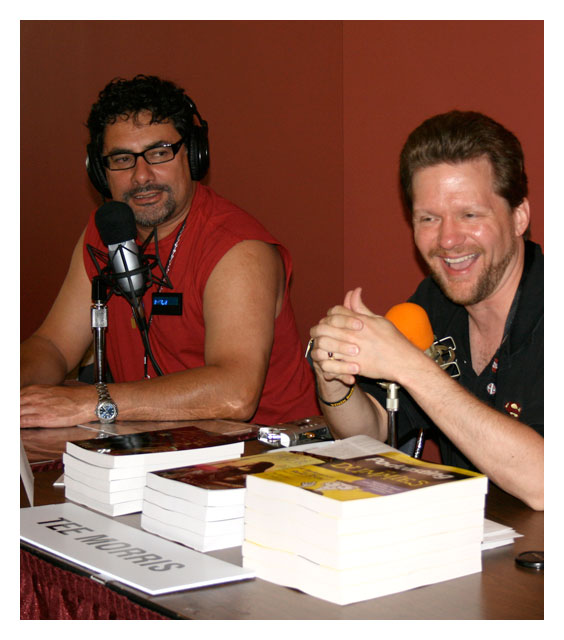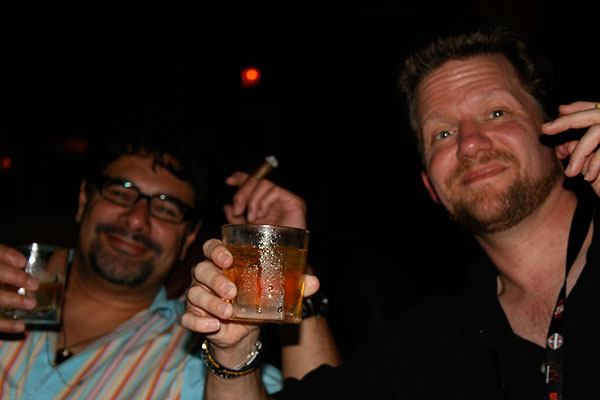 I’ve met a lot of incredible people in what will be ten years (come May) as an author. One real stand-out started as a star-struck business proposition between myself and Lani Tupu. People know him best for Captain Crais in Farscape, but Lani is a pretty multi-talented, multi-faceted dude. Artist. Teacher. Just an all-around good guy. There are two conversations with him that have always stayed with me, and this weekend one of those conversations came back with a vengeance.
I’ve met a lot of incredible people in what will be ten years (come May) as an author. One real stand-out started as a star-struck business proposition between myself and Lani Tupu. People know him best for Captain Crais in Farscape, but Lani is a pretty multi-talented, multi-faceted dude. Artist. Teacher. Just an all-around good guy. There are two conversations with him that have always stayed with me, and this weekend one of those conversations came back with a vengeance.
We (me, Lani, and our agent, Jean Orrico) were having a post-convention meal, following the first run of our workshop, From Page to Stage. I remember the subject turned to acting, and how I had resigned that I would not be returning to the stage.
Now this was before I had met Pip in person and understood just how dangerous it is to anger a kiwi. And Lani, when that resignation left my lips, was angry.
“You never stop being an actor!†he stated (quite passionately), “The stage will always be with you, and it will be waiting for you when you return.â€
It was more about the zeal behind his statement that stuck with me, and maybe at the time I thought “Spoken like a true-blue actor.†Lani’s sentiment was well intended, but I just felt like I had taken a different path at that crossroad.
This weekend, that changed.
Now on Audiobook Creation Exchange, Tee Morris is available for work.
Pip and I sat down and we looked up a variety of titles. Jules Verne. Non-fiction about Lincoln. Even a bit of erotica. All falling into my price range for audio. I went on and uploaded my samples, completed my profile, and fired up the mic, this time for ACX.
This shouldn’t feel weird, you know? I’ve been podcasting since 2005, been offering my voice to a variety of projects. While the actual audition — rehearsing the prepared piece, firing up the mic, and recording — is very easy for me, it still feels very weird. Maybe it’s because I thought this avenue of my life was done. Sure, I get my actor’s fix with podcasting, but I no longer needed to worry about the audition process. Here I was this weekend, though, stepping back on to a virtual stage and reading for a role. I had stepped back to those times when I would walk to the edge of a stage and say “Hi, I’m Tee Morris and my audition piece is…â€Â to a room of shadows. The audition itself was far less stressful than when I was acting. At least at first. I didn’t have to worry about my hairstyle, my headshot, or even what I was wearing. Just pull myself up to the SM7B and hit the red button.
But this weekend of aural auditions did make me step back to that life of wondering and waiting. It’s a special kind of neurotic state that you won’t ever see portrayed in Smash. Let me walk you through it…
You get to the audition, get handed a script, and after a few minutes with it, you give a reading. Something clicks. You feel it, and even you think you gave a great reading. If, however, you’re not seeing others audition, you have nothing or no one with whom to compare your reading. Then you begin to wonder “Could I have placed inflection someplace else?†Or how about “Did I really capture what the director wants in the character?†As you hear nothing in reply to an audition (and no, it’s not like in Smash where an agent calls you at random times of the day…), you start to second-guess what you did on that audition, an audition that you had described earlier as rock solid. Then, when you step up for your next audition, the previous audition rears its ugly head and suddenly you are wondering if you really are as talented as people tell you.
Sounds like fun, huh?
 ACX auditions, I’m finding, take this mind-bending experience to a whole new level. It’s no longer based on how you look but entirely on how you sound. There’s no direction, no quick pointers, no idea what people want. It’s all on you, how you interpret the narration, and the characters within the sample. It’s all about you, one blind reading, and the kind of voice you have…
ACX auditions, I’m finding, take this mind-bending experience to a whole new level. It’s no longer based on how you look but entirely on how you sound. There’s no direction, no quick pointers, no idea what people want. It’s all on you, how you interpret the narration, and the characters within the sample. It’s all about you, one blind reading, and the kind of voice you have…
Okay, let’s get right to the point — it’s coming down to the kind of voice I have. The decision of whether or not I am cast in a title comes down to my personal bass, tenor, and dialect.
As crazy as this may sound, I’ve actually missed this.
Whether it is fiction or non-fiction, this is a new kind of creative endeavor between artistic strangers. Yes, the audition is all about my voice, but it is also with how I handle the text. How I handle the text is a reflection on how I work, on my eye and ear for detail, and my abilities to give prose a compelling aural quality. It’s a new kind of collaboration, and I’m feeling an insatiable curiosity to see what is possible in this new opportunity. So, once again, I find myself checking the casting calls, seeing what’s available, and firing up the mic. I find myself, in a weird little way, back at the crossroads I thought were far in the distance behind me.
No, I’m not ditching the job hunt or dropping my writing projects. I’m just keeping an open mind, and anxious to see where this calling will lead.
Lani, you were right. You were right.
